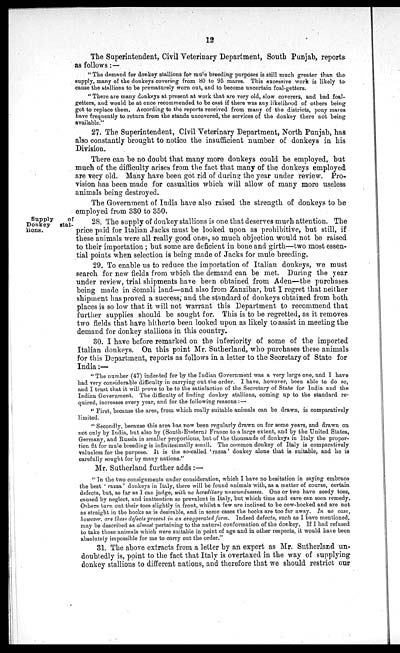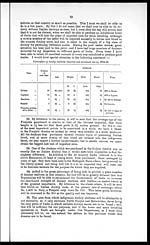Medicine - Veterinary > Civil Veterinary Departments > Annual administration report of the Civil Veterinary Department of India > 1894-1895 > Part I - Imperial report
(28) Page 12
Download files
Individual page:
Thumbnail gallery: Grid view | List view

12
The Superintendent, Civil Veterinary Department, South Punjab, reports
as follows:—
"The demand for donkey stallions for mule breeding purposes is still much greater than the-
supply, many of the donkeys covering from 80 to 95 mares. This excessive work is likely to-
cause the stallions to be prematurely worn out, and to become uncertain foal-getters.
"There are many donkeys at present at work that are very old, slow coverers, and bad foal-
getters, and would be at once recommended to be cast if there was any likelihood of others being
got to replace them. According to the reports received from many of the districts, pony mares
have frequently to return from the stands uncovered, the services of the donkey there not being
available."
27. The Superintendent, Civil Veterinary Department, North Punjab, has
also constantly brought to notice the insufficient number of donkeys in his
Division.
There can be no doubt that many more donkeys could be employed, but
much of the difficulty arises from the fact that many of the donkeys employed
are very old. Many have been got rid of during the year under review. Pro-
vision has been made for casualties which will allow of many more useless
animals being destroyed.
The Government of India have also raised the strength of donkeys to be
employed from 330 to 350.
Supply of
Donkey stal-
lions.
28. The supply of donkey stallions is one that deserves much attention. The
price paid for Italian Jacks must be looked upon as prohibitive, but still, if
these animals were all really good ones, so much objection would not be raised
to their importation; but some are deficient in bone and girth—two most essen-
tial points when selection is being made of Jacks for mule breeding.
29. To enable us to reduce the importation of Italian donkeys, we must
search for new fields from which the demand can be met. During the year
under review, trial shipments have been obtained from Aden—the purchases
being made in Somali land—and also from Zanzibar, but I regret that neither
shipment has proved a success, and the standard of donkeys obtained from both
places is so low that it will not warrant this Department to recommend that
further supplies should be sought for. This is to be regretted, as it removes
two fields that have hitherto been looked upon as likely to assist in meeting the
demand for donkey stallions in this country.
30. I have before remarked on the inferiority of some of the imported
Italian donkeys, On this point Mr. Sutherland, who purchases these animals
for this Department, reports as follows in a letter to the Secretary of State for
India:—
"The number (47) indented for by the Indian Government was a very large one, and I have
had very considerable difficulty in carrying out the order. I have, however, been able to do so,
and I trust that it will prove to be to the satisfaction of the Secretary of State for India and the
Indian Government. The difficulty of finding donkey stallions, coming up to the standard re-
quired, increases every year, and for the following reasons:—
"First, because the area, from which really suitable animals can be drawn, is comparatively
limited.
"Secondly, because this area has now been regularly drawn on for some years, and drawn on
not only by India, but also by (South-Eastern) France to a large extent, and by the United States,
Germany, and Russia in smaller proportions, but of the thousands of donkeys in Italy the propor-
tion fit for mule breeding is infinitesimally small. The common donkey of Italy is comparatively
valueless for the purpose. It is the so-called 'razza' donkey alone that is suitable, and he is
carefully sought for by many nations."
Mr. Sutherland further adds:—
"In the two consignments under consideration, which I have no hesitation in saying embrace
the best 'razza' donkeys in Italy, there will be found animals with, as a matter of course, certain
defects, but, so far as I can judge, with no hereditary unsoundnesses. One or two have seedy toes,
caused by neglect, and inattention so prevalent in Italy, but which time and care can soon remedy.
Others turn out their toes slightly in front, whilst a few are inclined to be cow-hocked and are not
as straight in the hocks as is desirable, and in some cases the hocks are too far away. In no case,
however, are these defects present in an exaggerated form. Indeed defects, such as I have mentioned,
may be described as almost pertaining to the natural conformation of the donkey. If I had refused
to take those animals which were suitable in point of age and in other respects, it would have been
absolutely impossible for me to carry out the order."
31. The above extracts from a letter by an expert as Mr. Sutherland un-
doubtedly is, point to the fact that Italy is overtaxed in the way of supplying
donkey stallions to different nations, and therefore that we should restrict our
Set display mode to: Large image | Zoom image | Transcription
Images and transcriptions on this page, including medium image downloads, may be used under the Creative Commons Attribution 4.0 International Licence unless otherwise stated. ![]()
| India Papers > Medicine - Veterinary > Civil Veterinary Departments > Annual administration report of the Civil Veterinary Department of India > 1894-1895 > Imperial report > (28) Page 12 |
|---|
| Permanent URL | https://digital.nls.uk/75501157 |
|---|



![[Page 11]](https://deriv.nls.uk/dcn4/7550/75501156.4.jpg)
